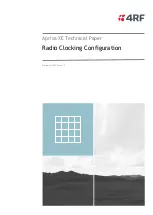
Aprisa XE Clocking Technical Paper
11 | 15
Issued by: 4RF Customer Services 15 January 2009
4.3.
Back to back links
– Framed E1
Figure 12 : Back to back framed E1 network diagram
The above network uses a repeater site to pass the radio traffic between two sites. The radio at the local
site
is set to internal and will generate the clocking for the entire network. The radios set to “Link” will
derive their clocking from the corresponding radio. At the repeater site the radios are interlinked via
framed E1. Because clocking information is not passed over a framed E1 the second radio link needs to
clock from the first radio link, in order to maintain synchronisation across the network. The radio at the
repeater site is set to External and is clocked of the incoming Framed E1 circuit.
4.4.
4 wire drop and insert
Figure 13 : Drop and insert 4 wire network diagram
The above network uses a repeater site to pass a 4 wire circuit between sites. This would be a typical
setup for 2 way radio site interlink, where keying of all sites at once is required. To facilitate the drop and
insert of the 4 wire circuits an external audio bridge is used.
As the traffic being transported is not digital, paired radios can be set to internal and link.

































